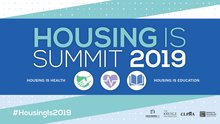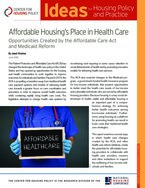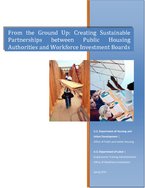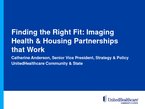0
Report
Community: Postsecondary
May 2, 2019
Innovative public housing authorities (PHAs) are collaborating with college access partners and community colleges to increase postsecondary educational achievement for low-income residents and college students experiencing homelessness. This report elevates 11 shared learnings from a recent convening of these five pioneering PHAs and their postsecondary collaborators, and offers a series of recommendations to policy makers, PHAs, and philanthropic organizations seeking to develop emerging cross-sector collaborations between housing and education organizations. The report also includes an overview of the federal policies that support and limit postsecondary achievement for students served by PHAs, and profiles of the five partnerships: CHA and partners City Colleges of Chicago and One Million Degrees; CMHA and partner Columbus State Community College; HACLA and partner Southern California College Access Network (SoCal CAN); LMHA and partner Family Scholar House; and THA and partner Tacoma Community College.
Authored by: Abra Lyons-Warren for CLPHA
Topics: CLPHA, Education, Housing, Legislation & Policy, Low-income, Partnerships, Post-secondary, Stability
 Shared by Abra Lyons-Warren
Shared by Abra Lyons-Warren
Abra Lyons-Warren posted a
on Oct 6, 2020
Abra Lyons-Warren for CLPHA
Innovative public housing authorities (PHAs) are collaborating with college access partners and community colleges to increase postsecondary educational achievement for low-income residents and college students experiencing homelessness.
0
Report
Community:
Jun 6, 2019
Trends in Housing Assistance and Who it Serves
Authored by: PAHRC
Topics: Community development, Disabilities, Education, Funding, Health, Homelessness, Housing, Legislation & Policy, Low-income, Partnerships, Research, Seniors, Workforce development, Youth
 Shared by Keely Stater
Shared by Keely Stater
Keely Stater posted a
on Sep 10, 2019
Trends in Housing Assistance and Who it Serves
0
Video
Community:
May 24, 2019
A landmark National Academies of Sciences report commissioned by Congress concludes that childhood poverty in the U.S. could be cut in half within a decade with appropriate action. The report culls through the existing evidence-base to identify the most impactful existing policies including the Earned Income Tax Credit (EITC) and housing assistance. This panel will also discuss promising new policies that if enacted could help reduce poverty such as the child allowance.
Authored by: Housing Is, CLPHA
Topics: Child welfare, CLPHA, Housing, Legislation & Policy, Low-income, Partnerships, Research
 Shared by Housing Is
Shared by Housing Is
Housing Is posted a
on May 24, 2019
A landmark National Academies of Sciences report commissioned by Congress concludes that childhood poverty in the U.S. could be cut in half within a decade with appropriate action.
0
Report
Community:
Apr 8, 2019
While the program has changed very little since its inception, the need for the program has increased. In 1975, the number of program grantees stood at 594. Today, the number of grantees stands at 1,268 as more communities qualify to receive direct program allocations. Based on a CDBG Needs Survey conducted by the CDBG Coalition (and discussed later in this report), CDBG grantees have delayed and canceled projects and reduced or permanently eliminated programs because of a lack of CDBG funds. CDBG is an important investment tool for communities and neighborhoods, but program funding must increase to meet local need to ensure CDBG grantee communities are healthy, vibrant and thriving.
Authored by:
Topics: Community development, Funding, Health, Homelessness, Housing, Legislation & Policy, Low-income, Partnerships, Research, Safety, Seniors
 Shared by Housing Is
Shared by Housing Is
Housing Is posted a
on Apr 8, 2019
A report of the CDBG Coalition
While the program has changed very little since its inception, the need for the program has increased. In 1975, the number of program grantees stood at 594. Today, the number of grantees stands at 1,268 as more communities qualify to receive direct program allocations.
0
News Article
Community:
Mar 6, 2019
Fort Worth’s work finding housing solutions for those facing homelessness can serve as a model for the rest of the country, Housing and Urban Development Secretary Ben Carson said Wednesday during a stop in Cowtown, one of several planned in Texas.
Authored by: Luke Ranker for Fort Worth Star-Telegram
Topics: Funding, Homelessness, Housing, Legislation & Policy, Low-income, Partnerships, South
 Shared by Housing Is
Shared by Housing Is
Housing Is posted a
on Mar 11, 2019
Luke Ranker for Fort Worth Star-Telegram
Fort Worth’s work finding housing solutions for those facing homelessness can serve as a model for the rest of the country, Housing and Urban Development Secretary Ben Carson said Wednesday during a stop in Cowtown, one of several planned in Texas.
0
Podcast
Community:
Feb 14, 2019
John King served in President Barack Obama’s cabinet as the 10th U.S. Secretary of Education. Secretary King is one of the most prominent voices on the connections between housing policy and education policy, particularly with respect to pervasive socioeconomic and racial segregation. We sat down with Secretary King in Los Angeles to discuss the state of modern-day school and housing segregation, why he prioritized integration while in office, promising practices on both the education and housing fronts, and why education advocates must also be housing advocates.
“As citizens, we need to be engaged on the issues that affect the kids and families that we serve,” said Secretary King. “We have to be engaged on housing…We have a responsibility as educators to be engaged across a range of issues.”
Authored by: Opportunity Starts at Home
Topics: Child welfare, Education, Homelessness, Housing, Legislation & Policy, Low-income, Partnerships, Youth
 Shared by Mica O'Brien
Shared by Mica O'Brien
Mica O'Brien posted a
on Feb 19, 2019
Opportunity Starts at Home
John King served in President Barack Obama’s cabinet as the 10th U.S. Secretary of Education. Secretary King is one of the most prominent voices on the connections between housing policy and education policy, particularly with respect to pervasive socioeconomic and racial segregation.
0
Publication
Community:
Jan 24, 2019
Affordable housing campaigns are not new, of course, but what is unprecedented and transformative about Opportunity Starts at Home is the scope and diversity of the partners that are joining forces to advocate for more robust and equitable federal housing policies. The campaign is advised by a Steering Committee including leading national organizations representing a wide range of interests that are working shoulder-to-shoulder to solve the affordable housing crisis.
Authored by: Opportunity Starts at Home
Topics: Asset building, Child welfare, CLPHA, Community development, Early childhood, Education, Food insecurity, Funding, Health, Homelessness, Housing, Immigrants, Legislation & Policy, Low-income, Mobility, Out-of-school time, Partnerships, Racial inequalities, Safety, Seniors, Stability, Substance abuse, Youth
 Shared by Mica O'Brien
Shared by Mica O'Brien
Mica O'Brien posted a
on Jan 24, 2019
Opportunity Starts at Home
Affordable housing campaigns are not new, of course, but what is unprecedented and transformative about Opportunity Starts at Home is the scope and diversity of the partners that are joining forces to advocate for more robust and equitable federal housing policies.
0
Webinar
Community:
Dec 17, 2018
Webinar slide deck that provides a brief overview of FUP, building blocks of successful FUP voucher implementation, facilitated panel on increasing impact and enhancing FUP operations, and other opportunities and resources.
Authored by: CSH: 1 Roof and CLPHA
Topics: Child welfare, CLPHA, Foster care, Funding, Housing, Legislation & Policy, Low-income, Partnerships, Preventative care, Safety, Supportive housing, Youth
 Shared by Mica O'Brien
Shared by Mica O'Brien
Mica O'Brien posted a
on Dec 18, 2018
Webinar slide deck that provides a brief overview of FUP, building blocks of successful FUP voucher implementation, facilitated panel on increasing impact and enhancing FUP operations, and other opportunities and resources.
0
News Article
Community:
Nov 30, 2018
The city and county of Durham, GoTriangle and the Durham Housing Authority are committed to enhancing opportunities for existing low-income families as well as to increasing the production of affordable housing. The light-rail project is critical to the success of these goals, and the success of these goals is critical to the light-rail project.
Authored by: Anthony Scott and John Tallmadge for The Herald Sun
Topics: Community development, Funding, Housing, Legislation & Policy, Low-income, Partnerships, South, Stability, Transportation
 Shared by Mica O'Brien
Shared by Mica O'Brien
Mica O'Brien posted a
on Dec 3, 2018
Anthony Scott and John Tallmadge for The Herald Sun
The city and county of Durham, GoTriangle and the Durham Housing Authority are committed to enhancing opportunities for existing low-income families as well as to increasing the production of affordable housing.
0
Publication
Community:
Nov 20, 2018
People with mental health disabilities are vastly overrepresented in the population of people who experience homelessness. Of the more than 550,000 people in America who experienced homelessness on a given night in 2017, 1 in 5 had a mental illness. The proportion of people experiencing chronic homelessness with mental health disabilities was even higher—nearly 1 in 3. Despite this fact, the reality is that most people with mental illness fortunately do not experience homelessness: While about 20 percent of all adults in the United States have a mental illness, less than two-tenths of 1 percent of people in the country experienced homelessness on a given night in 2017.
Authored by: Heidi Schultheis for Center for American Progress
Topics: Depression, Disabilities, Homelessness, Housing, Legislation & Policy, Low-income, Mental health, Partnerships, Preventative care, Stability, Substance abuse, Supportive housing
 Shared by Mica O'Brien
Shared by Mica O'Brien
Mica O'Brien posted a
on Nov 20, 2018
Heidi Schultheis for Center for American Progress
People with mental health disabilities are vastly overrepresented in the population of people who experience homelessness. Of the more than 550,000 people in America who experienced homelessness on a given night in 2017, 1 in 5 had a mental illness.
0
Report
Community:
Nov 16, 2018
Housing and school segregation function as mutually-sustaining phenomena that limit perceived housing and school choices, constrain social networks, and curb employment and educational potential. Despite the link between housing and school segregation, however, many initiatives combating segregation tend to focus on one or the other instead of recognizing their inherent connectedness.
Authored by: Phillip Tegleler and Micah Herskind for the Poverty and Race Research Action Council
Topics: Data sharing, Dual-generation, Education, Housing, Legislation & Policy, Low-income, Mobility, Partnerships, Racial inequalities, Research
 Shared by Mica O'Brien
Shared by Mica O'Brien
Mica O'Brien posted a
on Nov 16, 2018
Phillip Tegleler and Micah Herskind for the Poverty and Race Research Action Council
Housing and school segregation function as mutually-sustaining phenomena that limit perceived housing and school choices, constrain social networks, and curb employment and educational potential.
0
News Article
Community:
Nov 1, 2018
Number of homeless vets falls to approximately 38,000, a 5.3% decline since last year and about half the 73,367 veterans tallied in 2009.
Authored by: Ben Kesling for WSJ
Topics: Homelessness, Housing, Legislation & Policy, Low-income, Metrics, Partnerships
 Shared by Mica O'Brien
Shared by Mica O'Brien
Mica O'Brien posted a
on Nov 2, 2018
Number of homeless vets falls to approximately 38,000, a 5.3% decline since last year and about half the 73,367 veterans tallied in 2009.
0
Research
Community:
Oct 1, 2018
Although the rental assistance programs varied, key themes emerged, including (1) most programs, recognizing the impact of housing stability on health outcomes, targeted populations served by state or local health and human services programs; (2) most programs served a growing number of households over time; (3) funding generally increased over time and most of it came from general revenue; and (4) programs involved collaboration between the housing and health and human services agencies to ensure clients’ needs were comprehensively met.
Authored by: Anna Bailey, Peggy Bailey, and Douglas Rice for the Center on Budget and Policy Priorities
Topics: Funding, Health, Housing, Legislation & Policy, Low-income, Partnerships, Place-based, Research, Stability
 Shared by Mica O'Brien
Shared by Mica O'Brien
Mica O'Brien posted a
on Oct 9, 2018
Anna Bailey, Peggy Bailey, and Douglas Rice for the Center on Budget and Policy Priorities
Although the rental assistance programs varied, key themes emerged, including (1) most programs, recognizing the impact of housing stability on health outcomes, targeted populations served by state or local health and human services programs; (2) most programs served a growing number of households o
0
Report
Community:
Aug 1, 2018
Through the hard work of communities around the country, we now have proof of something that we didn’t before—that ending homelessness is achievable. Home, Together builds upon what we have learned from states and communities over time, and lays out the strategies we know we must advance at the federal level in order to support and accelerate state and local progress.
Authored by: United States Interagency Council on Homelessness
Topics: Cost effectiveness, Data sharing, Disabilities, Dual-generation, Homelessness, Housing, Legislation & Policy, Low-income, Mental health, Partnerships, Preventative care, Racial inequalities, Stability, Substance abuse, Supportive housing
 Shared by Housing Is
Shared by Housing Is
Housing Is posted a
on Aug 7, 2018
United States Interagency Council on Homelessness
Through the hard work of communities around the country, we now have proof of something that we didn’t before—that ending homelessness is achievable.
0
Research
Community:
Aug 1, 2018
We sought to learn more about how state- and locally funded rental
assistance programs were created, how they are structured, whom they serve, and how they are funded.
Authored by:
Topics: Cost effectiveness, Data sharing, Disabilities, Family engagement, Funding, Health, Homelessness, Housing, Legislation & Policy, Low-income, Partnerships, Research, Supportive housing
 Shared by Housing Is
Shared by Housing Is
Housing Is posted a
on Aug 1, 2018
We sought to learn more about how state- and locally funded rental
assistance programs were created, how they are structured, whom they serve, and how they are funded.
0
Policy Brief
Community:
Jul 20, 2018
This report examines several ways in which health care changes created by the ACA, and other health care reform initiatives, create the potential for affordable housing providers to collaborate with health care providers, insurers, and other institutions to support the wellbeing of low-income individuals and families.
Authored by:
Topics: Affordable Care Act, Health, Homelessness, Housing, Legislation & Policy, Low-income, Medicaid / Medicare, Partnerships
 Shared by Housing Is
Shared by Housing Is
Housing Is posted a
on Jul 20, 2018
This report examines several ways in which health care changes created by the ACA, and other health care reform initiatives, create the potential for affordable housing providers to collaborate with health care providers, insurers, and other institutions to support the wellbeing of low-income indiv
0
Publication
Community:
Jul 19, 2018
Assisting public housing residents on the path towards self-sufficiency requires going beyond providing decent, safe, and affordable housing. Public housing residents may face barriers to employment, such as limited education, job skills and/or proficiency in the English language. This toolkit is a resource for both frontline staff and management. It offers examples of how partnerships between DOL and HUD can increase public housing resident employment and create mutual benefit for both agencies.
Authored by:
Topics: Criminal justice, Disabilities, Funding, Housing, Legislation & Policy, Low-income, MTW, Partnerships, Workforce development
 Shared by Housing Is
Shared by Housing Is
Housing Is posted a
on Jul 19, 2018
Assisting public housing residents on the path towards self-sufficiency requires going beyond providing decent, safe, and affordable housing. Public housing residents may face barriers to employment, such as limited education, job skills and/or proficiency in the English language.
0
Research
Community:
Jul 19, 2018
The link between federal housing policy and public health has been understood since the nineteenth century, when housing activists first sought to abolish slums and create healthful environments. This article describes how the Obama administration—building on these efforts and those that followed, including the Great Society programs of President Lyndon Johnson—has adopted a cross-sector approach that takes health considerations into account when formulating housing and community development policy. The federal Department of Housing and Urban Development fully embraces this “health in all policies” approach. Nonetheless, the administration’s strategy faces challenges, including fiscal and political ones. Some of these challenges may be overcome by conducting quality research on how housing and community development policies affect health outcomes, and by developing a federal budget strategy that takes into account how investments in one sector contribute to cost savings in another.
Authored by:
Topics: Affordable Care Act, Community development, Disabilities, Health, Healthy homes, Housing, Legislation & Policy, Low-income, Mobility, Partnerships, Place-based, RAD, Research
 Shared by Housing Is
Shared by Housing Is
Housing Is posted a
on Jul 19, 2018
The link between federal housing policy and public health has been understood since the nineteenth century, when housing activists first sought to abolish slums and create healthful environments.
0
Publication
Community:
Jul 13, 2018
Authored by:
Topics: CLPHA, Data sharing, Health, Housing, Legislation & Policy, Low-income, Medicaid / Medicare, Partnerships, Preventative care, Research
 Shared by Housing Is
Shared by Housing Is
Housing Is posted a
on Jul 13, 2018
0
Publication
Community:
Jul 12, 2018
This brief aims to bring attention to non-Medicaid funding sources that states could potentially blend or braid to address social determinants of health and other needs that are not typically covered by Medicaid. It is intended to familiarize state Medicaid, public health, and other state policymakers with the funding streams of other agencies, and sketch out a continuum of options to help states coordinate funding to better serve the needs of low-income populations. Because this brief focuses on services for adult Medicaid beneficiaries, it does not address many of the funding sources available for children’s services. However, existing efforts to pool funds for children and youth—notably by the Commonwealth of Virginia—could prove instructive for states seeking to launch such an effort for adults.
Authored by:
Topics: Cost effectiveness, Data sharing, Dual-eligibles, Food insecurity, Funding, Health, Homelessness, Housing, Legislation & Policy, Low-income, Medicaid / Medicare, Mental health, Partnerships, Research, Substance abuse
 Shared by Housing Is
Shared by Housing Is
Housing Is posted a
on Jul 12, 2018
This brief aims to bring attention to non-Medicaid funding sources that states could potentially blend or braid to address social determinants of health and other needs that are not typically covered by Medicaid.
0
Publication
Community:
Jul 12, 2018
This report examines four specific aspects of the challenge before us:
• The need for a much greater supply of homes affordable to our nation’s lowest-income seniors.
• The importance of transforming homes and communities so that seniors can age with options, a desire shared by the overwhelming majority of older adults.
• The imperative to better integrate health care and supportive services with housing, recognizing that this integration has the potential to improve health outcomes for seniors and reduce the costs borne by the health care system.
• The need to deploy technologies on a far wider scale to help all Americans age successfully.
Authored by:
Topics: Cost effectiveness, Funding, Health, Home visiting, Homelessness, Housing, Legislation & Policy, Low-income, Medicaid / Medicare, Partnerships, Place-based, Preventative care, Seniors, Supportive housing
 Shared by Housing Is
Shared by Housing Is
Housing Is posted a
on Jul 12, 2018
This report examines four specific aspects of the challenge before us:
• The need for a much greater supply of homes affordable to our nation’s lowest-income seniors.
• The importance of transforming homes and communities so that seniors can age with options, a desire shared by the overwhelming ma
0
Report
Community:
Jul 12, 2018
This article deconstructs the history, structure, and financing that have made this unique partnership between Philadelphia's Department of Behavioral Health and Intellectual Disabilities, the Office of Homeless Services, and the Housing Authority, possible.
Authored by:
Topics: Data sharing, Disabilities, Dual-eligibles, Health, Housing, Legislation & Policy, Low-income, Medicaid / Medicare, Mental health, Partnerships, Preventative care, Research, Supportive housing
 Shared by Housing Is
Shared by Housing Is
Housing Is posted a
on Jul 12, 2018
This article deconstructs the history, structure, and financing that have made this unique partnership between Philadelphia's Department of Behavioral Health and Intellectual Disabilities, the Office of Homeless Services, and the Housing Authority, possible.
0
Policy Brief
Community:
Jul 10, 2018
This brief explores how state Medicaid agencies have utilized a variety of federal authorities and delivery systems to increase access to supportive housing services and highlights important implementation considerations.
Authored by:
Topics: Cost effectiveness, Criminal justice, Data sharing, Funding, Health, Healthy homes, Homelessness, Housing, Legislation & Policy, Low-income, Medicaid / Medicare, Mental health, Partnerships, Substance abuse, Supportive housing
 Shared by Housing Is
Shared by Housing Is
Housing Is posted a
on Jul 10, 2018
This brief explores how state Medicaid agencies have utilized a variety of federal authorities and delivery systems to increase access to supportive housing services and highlights important implementation considerations.
0
Report
Community:
Jul 10, 2018
In December 2016, federal and state policymakers examined the intersection of unstable housing and negative health outcomes at a meeting convened in Washington, D.C., by the National Academy for State Health Policy (NASHP) with support from The Commonwealth Fund. The goal of the meeting was to identify concrete policy recommendations and actionable steps to align health and housing programs to ensure that people with high service needs receive the housing and supportive services they need to become and stay healthy. This report summarizes their findings and recommendations.
Authored by:
Topics: Child welfare, Cost effectiveness, Data sharing, Disabilities, Dual-generation, Health, Homelessness, Housing, Legislation & Policy, Low-income, Medicaid / Medicare, Partnerships, Seniors, Supportive housing
 Shared by Housing Is
Shared by Housing Is
Housing Is posted a
on Jul 10, 2018
In December 2016, federal and state policymakers examined the intersection of unstable housing and negative health outcomes at a meeting convened in Washington, D.C., by the National Academy for State Health Policy (NASHP) with support from The Commonwealth Fund.
0
News Article
Community:
Aug 1, 2016
Boulder County, Colo., pioneered the movement. What can others learn from their experience?
Authored by: Mattie Quinn for Governing the State and Localities
Topics: Cost effectiveness, Data sharing, Dual-eligibles, Food insecurity, Health, Homelessness, Housing, Legislation & Policy, Low-income, Medicaid / Medicare, Partnerships, Place-based, Supportive housing, West Coast
 Shared by Housing Is
Shared by Housing Is
Housing Is posted a
on Jul 5, 2018
Mattie Quinn for Governing the State and Localities
Boulder County, Colo., pioneered the movement. What can others learn from their experience?
 Shared by Abra Lyons-Warren
on Oct 6, 2020
Shared by Abra Lyons-Warren
on Oct 6, 2020

 Shared by Keely Stater
on Sep 10, 2019
Shared by Keely Stater
on Sep 10, 2019


 Shared by Housing Is
on May 24, 2019
Shared by Housing Is
on May 24, 2019

 Shared by Housing Is
on Apr 8, 2019
Shared by Housing Is
on Apr 8, 2019
 Shared by Housing Is
on Mar 11, 2019
Shared by Housing Is
on Mar 11, 2019



 Shared by Housing Is
on Aug 7, 2018
Shared by Housing Is
on Aug 7, 2018

 Shared by Housing Is
on Aug 1, 2018
Shared by Housing Is
on Aug 1, 2018
 Shared by Housing Is
on Jul 20, 2018
Shared by Housing Is
on Jul 20, 2018
 Shared by Housing Is
on Jul 19, 2018
Shared by Housing Is
on Jul 19, 2018
 Shared by Housing Is
on Jul 19, 2018
Shared by Housing Is
on Jul 19, 2018
 Shared by Housing Is
on Jul 13, 2018
Shared by Housing Is
on Jul 13, 2018
 Shared by Housing Is
on Jul 12, 2018
Shared by Housing Is
on Jul 12, 2018
 Shared by Housing Is
on Jul 12, 2018
Shared by Housing Is
on Jul 12, 2018
 Shared by Housing Is
on Jul 12, 2018
Shared by Housing Is
on Jul 12, 2018
 Shared by Housing Is
on Jul 10, 2018
Shared by Housing Is
on Jul 10, 2018
 Shared by Housing Is
on Jul 10, 2018
Shared by Housing Is
on Jul 10, 2018
 Shared by Housing Is
on Jul 5, 2018
Shared by Housing Is
on Jul 5, 2018














